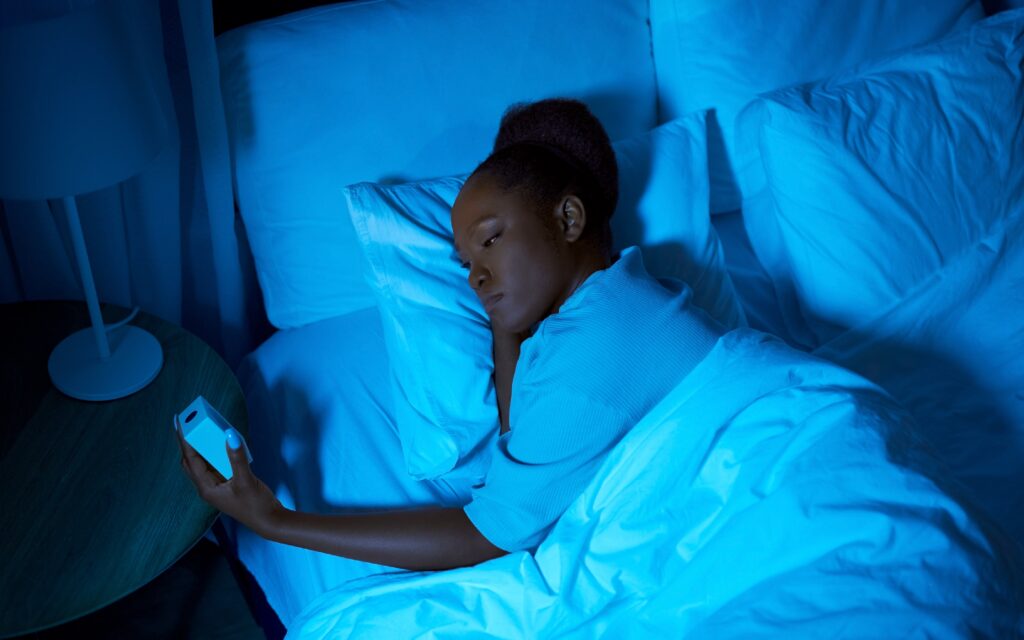Is insomnia genetic?
Studies are beginning to indicate the answer may be “yes”. One report on the human genome from 2018 confirmed insomnia is at least partially genetic. Various other pieces of research into sleep genes and hereditary conditions share this conclusion.
So, what does this mean for insomniacs? If genetic sleep disorders are a real problem, you might be wondering how you could possibly overcome your recent bout of sleep deprivation.
The good news is that although genetic insomnia does appear to be a real issue, this doesn’t mean you can’t move past your problems with sleep.
Many of the studies into hereditary sleep disorders indicate that people with bad sleep genes can still adjust their lifestyles to improve their sleep pattern.
Here’s what you need to know about hereditary insomnia.
Is insomnia genetic? Genetic sleep disorders
Sleep disorders affect people all over the world. Around 20% of people in America alone say they suffer from insomnia.
Throughout the globe, people are constantly searching for ways to overcome restless nights, and fitful dreams. For most of these individuals, it can seem as though insomnia has no rhyme or reason. That’s part of what makes the experience so frustrating.
However, according to recent research, insomnia could have something to do with your genes.
Although genetic sleep disorders have been proven by numerous studies, it’s worth noting insomnia isn’t caused by genetics alone.
Several psychological and physiological factors can contribute to issues with sleep. Some people struggle to get enough sleep due to stress, others have an issue with drinking too much caffeine.
Genetic insomnia is just one reason you could be having those sleepless nights.
Hereditary insomnia is what happens when the genes passed down to you from your ancestors predispose your brain and body to sleepless nights.
Essentially, you end up with a certain instruction in your genome which stops your brain from shutting down properly at night.
How bad can genetic insomnia be?
Studies show a few sleep disorders have an established basis in our genes. The genetic makeup passed throughout families can influence the way the brain responds to sleep triggers.
You may also be genetically predisposed to getting a lower quality of sleep, with fewer deep sleep or REM periods.
According to one piece of in-depth research, there are around 57 regions of the genome (containing around 236 genes in total) can be linked to symptoms of insomnia.
There are various forms of hereditary insomnia, some more worrisome than others. Some of the most common hereditary sleep disorders linked to the genes include:
- Chronic primary insomnia (constant trouble sleeping)
- Familial advanced sleep-phase syndrome
- Fatal familial insomnia
- Narcolepsy with cataplexy
Perhaps the most dangerous form of hereditary insomnia is fatal familial insomnia. This is an extremely rare condition that causes difficulty sleeping and potential brain damage.
An inability to sleep gradually destroys various parts of the brain in this condition, causing premature death.
Fortunately, not all forms of genetic insomnia are deadly.
It is possible to overcome various forms of insomnia, including those caused by genes.

Does insomnia run in families: Understanding genes
Genes are the blueprints for your unique structure as a person. However, you won’t necessarily see an impact from every gene which makes you different.
A person’s psychological nature, behavior, and various other things are affected by something called” gene expression”.
Gene expression refers to the information from your genes your body uses more frequently than others. If you can think of genes like instructions on how to run your body, gene expression works like the switch that turns certain instructions on and off.
For instance, if you run a lot and visit the gym often, then you’ll create more cardio proteins to adapt to your lifestyle. This means someone with genetic insomnia is just more likely to end up with sleeping problems.
However, other environmental factors need to be present to trigger the insomnia sleep genes to start sending instructions.
Though studies show hereditary insomnia is real, people who experience genetic insomnia can also go on to sleep normally again in the future. If you work on your insomnia with light therapy and sleep hygiene, you can improve your situation.
Gene expression means people with insomnia in their genetics are at higher risk of developing insomnia. However, there’s no guarantee you’ll end up with insomnia. There’s also no guarantee you won’t have sleeping problems, if you don’t have one of these genes.
Can genetic insomnia be cured?
So, can insomnia be cured?
This is a complicated question. Insomnia is an issue a lot of people face for different reasons. Ultimately, your body will eventually get some sleep, whether you like it or not.
However it can take some time and practice to find a cure to improve your sleep pattern.
The reality is insomnia is usually a symptom of another, underlying issue, rather than an independent problem on its own.
Insomnia is usually accompanied by things, like stress or anxiety, depression, discomfort, or even various other sleep disorders.
For instance, if you have restless leg syndrome, or talk in your sleep, you’re more likely to have insomnia too.
Since insomnia isn’t a standalone issue, fixing the problem often means finding the underlying cause.
Around 20% of the US population has an anxiety disorder, and insomnia is one of the most common symptoms caused by depression and anxiety.
If you have problems with your emotional or mental health, then getting to the bottom of those will often help with your insomnia too.
Depression and anxiety are also conditions with genetic links. If your family members have suffered with insomnia and anxiety, then you might experience both of these things too.
However, this will only be the case when you’re exposed to the right environmental factors.
It’s not just mental disorders which can cause insomnia either. Genetic disorders often passed through families, like diabetes, can also influence your risk of having a sleep issue.
To cure genetic insomnia, your doctor will often talk to you to get to the bottom of the problem. There’s likely to be more to it than just “bad sleep”. Once you know what the issue is, you can begin a treatment strategy, which might combine:
- Cognitive behavioral therapy and stress relief
- Yoga, meditation, or breathing control
- Sleep hygiene improvement
- Following a nighttime ritual
- Medications for underlying illness

Can all hereditary sleep disorders be cured?
Genetic insomnia is often easier to cure than other hereditary conditions, because it’s influenced by external and environmental factors. Unfortunately, there are some parts of your genes you might not be able to overcome as easily.
Narcolepsy with cataplexy is one example of a sleeping disorder which may be influenced by genetics. There are medications available to assist with this condition, such as Sodium Oxybate, which helps to improve nighttime sleep and reduce daytime drowsiness. Unfortunately, there’s no cure for this condition.
Another hereditary sleep disorder is familial advanced sleep phase syndrome, which is categorized by waking up too early, or sleeping for too long during the night.
There are some treatments available for this, like light therapy, which could be helpful for some patients.
Fatal familial insomnia is the most severe form of genetic insomnia, and it has no cure. Currently, experts predict this condition affects around 1 in 1 million people each year.
This genetic abnormality causes the death of neurons in the brain, and causes problems with the regulation of body temperature. Fatal familial insomnia occurs due to a mutation in the gene called ”PRNP”, which harms the nervous system.
Over time, the condition causes increasingly worsening brain damage. Although this condition is very serious, it’s also very rare.
With a little luck, you’ll never have to deal with this condition, or encounter anyone else who has.
Understanding your sleep genes
Genetic insomnia is a real thing, but your parents having insomnia isn’t a guarantee you’ll also suffer. There are various genes in your body that can influence parts of your life.
Your gene expression is what dictates whether you’ll really notice the impact of those genes or not. If you’re concerned about your sleep genes, you could consider looking into genetic testing.
Many of the genetic testing kits on the market today can test for the genes that make you more predisposed to insomnia.
However, you may find it more helpful to speak to people in your family who have already experienced this problem. Find out how they’ve handled their sleep issues over the years, and try improving your own sleep hygiene.
If you’re concerned about your sleep problems, then you should also book an appointment with a doctor. Remember, insomnia is just a symptom of an underlying problem most of the time.
Speaking to your doctor will make it easier for you to come up with a treatment strategy that addresses the root of the issue, so you can enjoy a better quality of sleep.
Siestio. Sleep matters.
General advice disclaimer
This article contains general tips and advice. However, no diet or exercise program should be started without consulting your physician or other industry professional first. For more information read our full disclaimer here.







